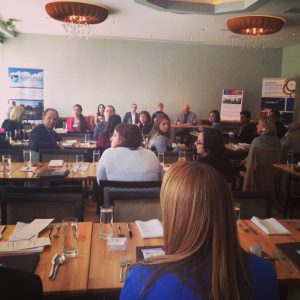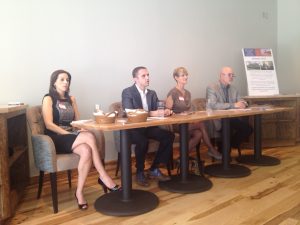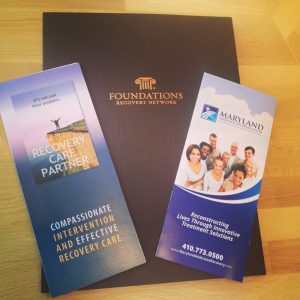On Thursday, April 17th, 2014 Maryland Addiction Recovery Center (MARC) co-hosted an event at Cunningham’s in Towson, MD to promote communication and collaboration between local addiction treatment providers in the local and regional area. The free luncheon focused on “Improving Client Recovery Outcomes through Better Collaborative Care” and featured a panel discussion and a question & answer segment between the panelists and those professionals in attendance. The panel was one example of the continuum of care in addiction treatment and featured a panelist in every level of addiction treatment & care: interventionist Don Sloane of Recovery Care Partner, Paige Bottom (CEO of Foundations Recovery Network’s La Paloma Treatment Center, an inpatient/residential facility in Memphis, TN) and Sam Bierman, Executive Director of Maryland Addiction Recovery Center, an comprehensive outpatient detox/IOP treatment center in Baltimore County. The panel was facilitated by Nolyn Pascal, a local member of the business development department of Foundations Recovery Center.
The event, as described by the panel, was a call to action for local providers to better collaboration between every level of addiction treatment and therefore improve the outcomes of clients receiving treatment. The mission of the event was stated thusly:
“We would like to welcome everyone for joining us today. Through initial conversations, we felt this type of platform of open communication and discussion would really benefit all of in the treatment field, but even more so those individual providers on the front lines of addiction and mental health.
Our collective experience is that while there are countless well-qualified and well-intended providers across the treatment continuum, there is a gap in how clients are transitioned from one level of care to the next. We believe that the gap in effective transition is a significant contributing factor to the poor outcomes that are associated with treatment for addiction, chemical dependency and substance abuse. Our goal today, actually the reason why we invited you, is to invite you in to begin a dialogue. Simply stated the dialogue is this: How can we collectively create more positive outcomes by finding effective points of collaboration across providers? How can we improve client recovery outcomes by bettering provider collaboration in the continuum of care? In the interest of transparency, when we were preparing for today we realized we would like today’s discussion to be taken as a call to action.
Our panel members today represent one example of a continuum of care: Don Sloane is an interventionist and is at the front end of the process. Paige Bottom, CEO of La Paloma Treatment Center in Memphis, Tennessee, brings her perspective from the inpatient or residential component of treatment. Sam Bierman, Executive Director of local detox/IOP Maryland Addiction Recovery Center, will speak to the intensive outpatient and clinical transition. Don will also speak from the perspective of transitional living from his experience with Bethesda House, a transitional sober living home in Bethesda, MD. From there we are going to open up the panel to questions and a dialogue among the panelists and all of you in attendance. Our goal for today’s get together is that you leave here with some new information about how we as practitioners can collectively create more effective outcomes for those whose lives we touch.”
The event was free to those in attendance and was geared toward individual providers and private therapists who are often on the front lines of families seeking help for their loved ones suffering from addiction and alcoholism. Many times, it is the private therapists who first see someone suffering from addiction and when a person needs a higher level of care (whether it is a detox, an IOP or a residential stay at a facility), it is the private therapist who facilitates that process and refers the client and family to the higher level of care. Many times, a therapist continues to work with the family of an addict while the addict is receiving treatment someone else. However, often the collaboration and communication breaks down once the process starts.
Improving Recovery Outcomes in Maryland
We at Maryland Addiction Recovery Center feel the addiction treatment industry can do better. We believe it is our roll as drug treatment providers to up the ante and perform better for our clients and their families. We believe we need to do better for the private therapists and integrate them more into the process. We believe providers at different levels of care need to communicate better as a client passes through stages of addiction treatment. We believe working together as an industry will offer better treatment and better support for the clients and their families. The purpose of the event was to begin a dialogue between local providers as to what the challenges currently are related to addiction treatment industry provider collaboration and what the solutions are to fix the problems. How can we work better together to work better for our clients?
Out of this dialogue will begin an educational series co-hosted by Maryland Addiction Recovery Center that will be open to addiction treatment providers, therapist, other industry professionals, members of local government, addicts and their families to better see how we are a community can better treatment, end addiction stigmas, create a supportive local recovery community and make sure the parents of children are aware and educated on issues regarding drugs, alcohol, addiction and treatment.
More information on this upcoming educational series will be made available in the coming weeks.
“Growth means change and change involves risk, stepping from the known to the unknown” – George Shinn
If you or someone you know is suffering from a drug and alcohol addiction and needs treatment please call us for help. Maryland Addiction Recovery Center offers the most comprehensive addiction treatment in the area. If we aren’t the best fit, we will work with you to find a treatment center that fits your needs. Please call us at (410) 773-0500 or email info@marylandaddictionrecovery.com. For more information on all of our alcohol and addiction treatment services and resources, please visit the web site at www.marylandaddictionrecovery.com.



